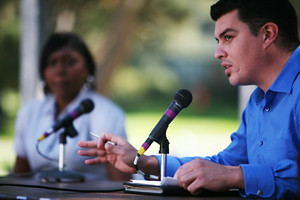You Ask, We Answer: Who Benefits from the Bush Tax Cuts?
By
Mattea Kramer
Posted:
|
Budget Process
Last week President Obama affirmed his support for letting the Bush-era tax cuts expire for American families making over $250,000. There was a flurry of activity on our Facebook page as folks debated the merits of extending all the tax cuts versus allowing them to expire for upper-income taxpayers.

Heated debate.
And there were lots of questions and some confusion over who benefits from these tax cuts, which were originally passed by President George W. Bush and were extended by President Obama in 2010. These tax cuts benefit nearly every American family, though they've been criticized heavily for extending the greatest benefits to wealthy people. (National Priorities Project maintains the website CostofTaxCuts.com to track tax cuts for the wealthiest 5 percent of Americans; the Bush-era tax cuts have certainly offered more generous benefits to top taxpayers.)
On our Facebook page, some people noted that wealthy Americans already pay more taxes than their working-class counterparts – thus they shouldn't be made to pay more. Others argued with that point of view, saying that rich Americans actually pay less than their fair share. Our mission at National Priorities Project is to arm you with facts and let you decide, so here are some useful points:
Wealthy Americans in general send far more cash to the government than do folks in the middle and lower rungs of the income ladder; that's because, when you make more money, you generally owe more in taxes. However, that doesn't always mean these wealthy taxpayers pay higher tax rates than middle-class Americans. For instance, Mitt Romney – a millionaire many times over – paid an effective federal income-tax rate of around 15 percent last year. Plenty of middle-class Americans pay federal income-tax rates higher than that – often closer to 25 percent. Of course, 25 percent of a middle-class income is a few thousand dollars, while 15 percent of Mitt Romney's income is in the millions of dollars. On the whole, our partner research organization Citizens for Tax Justice found that the wealthiest 1 percent of Americans earn just over 20 percent of all income in this country and pay 21.5 percent of all federal, state, and local taxes. That means wealthy Americans are paying a share of taxes that is just slightly larger than their share of all income.

Whether all of this indicates that our tax system is unfair, and for whom, is up to you to decide.
But there was also disagreement on our Facebook page about the economic impact of allowing the Bush-era tax cuts to expire for wealthy folks. There was concern that allowing rates to rise for high earners would harm job creation. This idea is not supported by evidence. Economist Christina Romer had a recent piece in the New York Times reviewing evidence on how changes in tax rates – such as the proposed expiration of the Bush rates – affect economic activity. Hardly at all, is the answer.